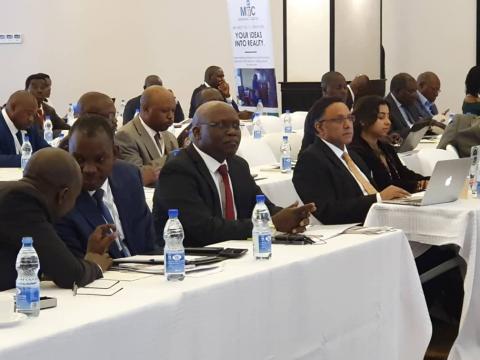
OPENING REMARKS BY
HON. HON. GABRIEL ARINDRU AJEDRA
MINISTER OF STATE FOR FINANCE, PLANNING AND ECONOMIC DEVELOPMENT
AT THE 10th NATIONAL COMPETTIVENESS FORUM,
NOVEMBER 7, 2019, MESTIL HOTEL
Honorable Ministers,
Hon. Members of Parliament,
Development Partner Representatives,
Permanent Secretaries Present,
Your Excellences,
Ambassadors and High Commissioners,
Government Officials Present,
Private Sector representatives,
Members of the Press,
Distinguished,
Ladies and Gentlemen.
1. Let me start by thanking you for participating in this year’s Competitiveness Forum that brings us together to discuss and share experiences on how to take this country forward.
2. My Ministry conceptualized the National Competitiveness Forum as a principal platform for the public and private sector to engage in identifying best practices and emerging issues in private sector development, competitiveness and the investment agenda to ensure sustainable and inclusive growth. I am happy that over the past nine forums, it has proven to be an important platform for concretizing key interventions to plan for and prioritize in fostering private sector competitiveness.
3. As you are all aware, Uganda aspires to become a middle-income country by 2040, through strengthening the country’s competitiveness for sustainable wealth creation, employment and inclusive growth. Government’s macroeconomic and development policy agenda over the medium term will therefore focus on bolstering the pace of industrialization in a bid to improve the country’s competitiveness, expand exports, generate employment and raise agricultural productivity.
4. Uganda’s economy continues to expand and grow. Over the last five years, economic growth averaged five percent with the size of the economy more than doubling from UShs 46.9 to UShs. 101.0 trillion. Critical infrastructure gaps are being closed and human development outcomes are improving. These are foundational issues that must be addressed before we can talk of being competitive.
5. Uganda’s competitiveness performance improved by 11 positions to 116th out of 190 economies interviewed by in the 2020 Doing Business Report. Also according to the 2019 Global Competitiveness Report, Uganda improved its position by 2 places ranking at 115th. Areas of particular progress are market efficiency and macro-economic environment. However we are still below the Sub-Saharan average in most performance areas and we must do more especially by enhancing the innovation and incubation ecosystem in the country. I expect that our discussions will yield concrete recommendations for the NDPIII process and the FY 2020/21 budget process.
6. The 10th NCF is timely given the numerous issues happening in the economy including; the ongoing trade wars between major economies ( USA and China) growing protectionism experienced through Unfair tarrifs and Non – Tarrif Barriers, the growing impact of technology innovations, industrial revolution, and digital transformation.
7. Ladies and Gentlemen, government is in the process of drafting the third National Development Plan (NDP III) which is expected to deliver sustainable industrialization and sustain the targeted growth projections for the next 10 years. Its therefore critical timing for us to concretize our discussions on boosting productivity in agriculture, boosting innovations and competitiveness of agro- products as well as enhancing value in our agro exports to mitigate existing challenges that prompted the EU audit on our Agro-exports.
8. The forums’ focus on Agro-industrialization should enable us identify competitiveness gaps and remedial measures to achieve the desired growth targets, boost export earnings and mechanisms to integrate the 68% population in subsistence into the money economy.
9. Ladies and Gentlemen, Uganda has been named the most entrepreneurial country in Africa with an entrepreneurship rate of 28.1 percent. This is an indication that the enabling environment for businesses to thrive exists. However, a majority of enterprises in Uganda still suffer a high mortality rate with 90% of them operating for less than 20 years and many not making it past the 5 year mark. This forum should discuss interventions for lowering such high mortality rates in our entrepreneurial ecosystem.
10. Some of the challenges affecting enterprises have been identified as lack of formal skills, no clear addresses and operating in an informal manner, using basic technology. These kind of limitations cannot foster a progressive entrepreneurship culture. The policy agenda therefore must emphasize building capacity for innovation; encouraging entrepreneurship; and incubating new technologies. Innovation is critical to survival of the enterprise, and a key component of competitiveness.
11. Government is undertaking a number of measures to improve the country’s competitiveness and has made considerable progress in fostering the enabling environment especially the policy environment and institutions. A National Investment Policy was drafted last year with the aim of accelerating investment growth and diversification for socioeconomic transformation. The policy is expected to create an enabling environment for enterprises to be able to improve their productivity and competitiveness, as well as strengthening the investment, legal and regulatory regime. It is due for Cabinet approval.
12. During the 8th NCF I launched the National Strategy for Private Sector Development that is aimed at boosting investor confidence for enterprise development and industrialisation. The strategy is monitored by a Private Sector Working Group, a multi stakeholder representatives of key private sector players who provide an annual private sector position paper for the consideration in the budget process. The deliberations today will provide critical input into this position paper.
13. Let me end by reiterating Government’s commitment to improving the business environment through skills development, business development services, incubation and developing of standards to enable us compete effectively in domestic, regional and international markets. All these have been critically selected and laid out in the forum program to enable you provide feedback to my ministry for effective planning and economic management.
With these remarks, I officially open the 10th National Competitiveness Forum and wish you fruitful deliberations.
FOR GOD AND MY COUNTRY
